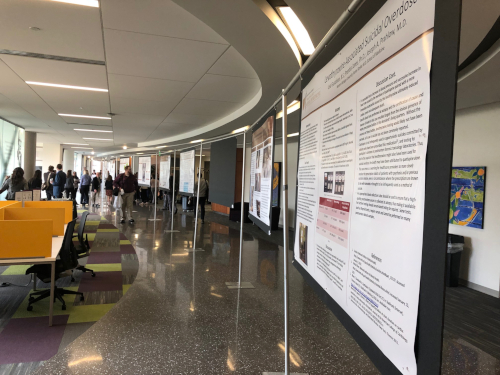
Members of the Kalamazoo medical community and WMed students, faculty and staff filled the first and second floors of the W.E. Upjohn M.D. Campus in April for the 37th Annual Kalamazoo Medical and Health Sciences Research Day.
The annual event, which was held on April 16 and 17, 2019, recognizes what is a proud tradition of medical and health sciences research in the Kalamazoo community. Research Day also offers time to take a step back and celebrate, and to develop and promote the richness and diversity of research in the local medical community.
More than 650 people attended this year’s event and had the opportunity to hear 30 oral presentations and view 95 poster presentations spanning the areas of clinical research, medical education research, community and public health research and basic science research.
James M. DuBois, PhD, ScD, who is the Steven J. Bander Professor of Medical Ethics and Professionalism, Professor of Psychology and Professor of Medicine, as well as director of the Center for Clinical Research Ethics at Washington University School of Medicine in the Division of General Medical Sciences, was the keynote speaker for Research Day. Dr. DuBois presented “Doing Good Research: Learning from the Mistakes and Successes of Others” during the Dr. Robert P. Carter Research Lecture.
The event marked what was the 11th year for the annual lecture, which is supported by the medical school’s Board of Directors to celebrate the Research Day activities and to recognize Dr. Carter’s commitment and support of research.
Dr. DuBois, who runs the Professionalism and Integrity in Research Program in the Center for Clinical and Research Ethics at Washington University, said clients are usually referred to his program after a lapse in research compliance or integrity. He said he also studies what research exemplars are doing.
Dr. DuBois said a lot of the skills researchers need, such as leadership skills and management skills, go beyond what they pick up in their training.
“A lot of times people learn research primarily through mentorship, training with a principal investigator or serving someone who’s PI in a clinical trial, and if those people aren’t modeling great behaviors, it’s very difficult for them to learn them,” Dr. DuBois said.
